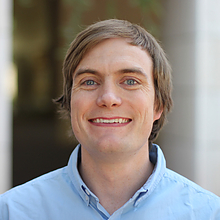 Christopher Metzler, an assistant professor of computer science with an appointment in the University of Maryland Institute for Advanced Computer Studies, has received funding from the National Science Foundation (NSF) to advance his work in “descattering,” which involves developing novel ways for computers to “see through” objects and obstructions that scatter light.
Christopher Metzler, an assistant professor of computer science with an appointment in the University of Maryland Institute for Advanced Computer Studies, has received funding from the National Science Foundation (NSF) to advance his work in “descattering,” which involves developing novel ways for computers to “see through” objects and obstructions that scatter light.
Metzler is principal investigator of an NSF Faculty Early Career Development Program (CAREER) award, expected to total just under $650,000 over the next five years.
This highly competitive award, considered one of NSF’s most prestigious awards in support of early-career faculty, is given to researchers who have the potential to serve as academic role models in research and education and to lead advances in the mission of their department or organization.
Metzler’s project looks to develop a “neural computational imaging” framework capable of solving challenging, high-dimensional, non-stationary computational-imaging problems.
The framework consists of three key innovations, Metzler says. First, functional neural signal representations will be used to capture and exploit a signal's low-dimensional structure and temporal regularity without explicit models. Second, neural forward operators will provide an interpretable, computationally efficient, and easy-to-calibrate approach to model non-stationary imaging inverse problems. Finally, self-supervised learning will be used to extract data-driven priors in imaging applications where ground-truth images/signals are not available.
When completed, the project looks to provide breakthrough imaging-through-scattering capabilities for use in national defense, remote sensing, robotics, astronomy, microscopy, endoscopy, pathology, and other applications.
Imaging through scattering is arguably the most challenging open problem in applied optics today, Metzler says. If one could overcome scattering and other optical aberrations, it would offer a way to see through tissue to observe “biology in action” at the cellular scale; see through fog, smoke and inclement weather to safely navigate in adverse conditions; see through the atmosphere to allow ground-based telescopes to outperform the James Webb Space Telescope for a fraction of the cost; and see through thin fiber bundles to enable minimally invasive endoscopy.
The physics of scattering is now relatively well-understood and the obstacles to effectively image through scattering are primarily computational in nature, Metzler explains. Existing algorithms cannot efficiently disentangle measurements of scattered photons to recover the underlying structure of a time-varying three-dimensional scene hidden behind a scattering medium, he explains.
The NSF-funded project will develop a collection of signal processing and machine learning innovations to broadly address this challenge and will also build a portable imaging-through-scattering demonstrator that can be used to engage high-school and undergraduate students in STEM.
The CAREER award will also support the development of a new, hands-on cross-disciplinary undergraduate computational-imaging course that can improve U.S. workforce development in this area.
Metzler has been a faculty member at UMD since 2021. Before coming to Maryland, he was an Intelligence Community Postdoctoral Fellow in the Stanford Computational Imaging Lab. He was also an NSF Graduate Research Fellow, a DoD NDSEG Fellow, and a NASA Texas Space Grant Consortium Fellow.
He received his doctorate in electrical and computer engineering from Rice University in 2019.
***
“Neural Computational Imaging—A Path Toward Seeing Through Scattering” is supported by NSF grant #2339616 from the NSF’s Division of Computing and Communication Foundations.
PI: Christopher Metzler, an assistant professor of computer science with an appointment in the University of Maryland Institute for Advanced Computer Studies.
About the CAREER award: The Faculty Early Career Development (CAREER) Program is an NSF activity that offers the foundation’s most prestigious awards in support of junior faculty who exemplify the role of teacher-scholars through outstanding research, excellent education and the integration of education and research within the context of the mission of their organization.